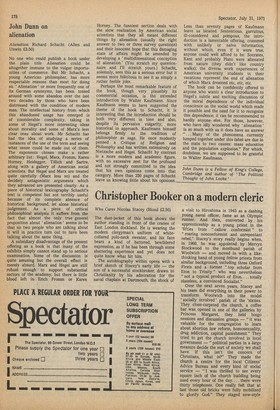John Dunn on alienation
Alienation Richard Schacht (Allen and Unwin £3.50) No one who could publish a book under the plain title Alienation could be altogether immune to the vulgar importunities of commerce. But Mr Schacht, a young American philosopher, has more respectable reasons than most for doing so. ' Alienation ' or more frequently one of its German synonyms, has been tossed around with some abandon over the last two decades by those who have been distressed with the condition of modern man. The intellectual history from which this abandoned usage has emerged is of considerable complexity, taking in some of Hegel's more interesting ideas about morality and some of Marx's less clear ones about work. Mr Schacht has had the idea of studying a series of instances of the use of the term and seeing what sense could be made out of them. The exponents chosen make a rather arbitrary list: Hegel, Marx, Fromm, Karen Homey, Heidegger, Tillich and Sartre, along with a gallery of American social scientists. But Hegel and Marx are treated quite carefully (Marx less so) and the decidely antagonistic arguments which they advanced are presented clearly. As a piece of historical lexicography Schacht's text is competent but not terribly useful because of its complete absence of historical background, let alone historical judgement. As a piece of critical philosophical analysis it suffers from the fact that almost the only true general proposition about ' alienation ' seems to be that no two people who are talking about it will in practice turn out to have been talking about the same thing.
A subsidiary disadvantage of the present offering as a book is that many of the exhibits simply cannot stand up to serious examination. Some of the discussion is quite amusing but the overall effect is merely absurd. Marx and Hegel are still robust enough to support substantial sectors of the academy, but there is little blood left in Erich Fromm or Karen Homey. The funniest section deals with the slow realization by American social scientists that they all meant different things by alienation (usually the right answer to two or three survey questions) and their innocent hope that this damaging state of affairs might be amended by developing a 'multidimensional conception of alienation.' (You scratch my questionnaire and I'll scratch yours.) Schacht, solemnly, sees this as a serious error but it seems more felicitous to see it as simply a rather feeble joke.
Perhaps the most remarkable feature of the book, though very plausibly its commercial occasion, is the extended introduction by Walter Kaufmann. Since Kaufmann seems to have suggested the theme of the book to Schacht, it is interesting that the introduction should be both very different in tone and also, despite its pervasive vulgarity, more historical in approach. Kaufmann himself belongs firmly to the tradition of philosopher as sage. He once modestly penned a Critique of Religion and Philosophy and has written extensively on Nietzsche and Hegel. Schacht by contrast is a more modern and academic figure, with no excessive zest for the profound and not strongly committed to the idea that his own opinions come into that category. More than 250 pages of Schacht leave us knowing little about his opinions Less than seventy pages of Kaufmann leave us bloated. Sententious, garrulous, ill-considered and pompous, the introduction is a lamentable offering, crammed with unlikely or naive information, without which, even if it were true, anyone could well afford to be: Socrates, Kant and probably Plato were alienated from nature (they didn't like country walks); the diverse work experiences of American university students in their vacations represent the end of alienation of which Marx dreamed etc, etc, etc.
The book can be confidently offered to anyone who wants a clear introduction to Hegel's subtle and exciting discussion of the moral dependence of the individual conscience on the social world which made it possible and the need for it to recognize this dependence; it can be recommended to hardly anyone else. For those, however, who have idly wondered why ' alienation ' is so much with us it does have an answer " ... Many of the phenomena currently lumped together under this label are due in the main to two causes: mass education and the population explosion." For which, doubtless, we are supposed to be grateful to Walter Kaufmann.
John Dunn is a Fellow of King's College, Cambridge and author of The Political Thought of John Locke'










































 Previous page
Previous page